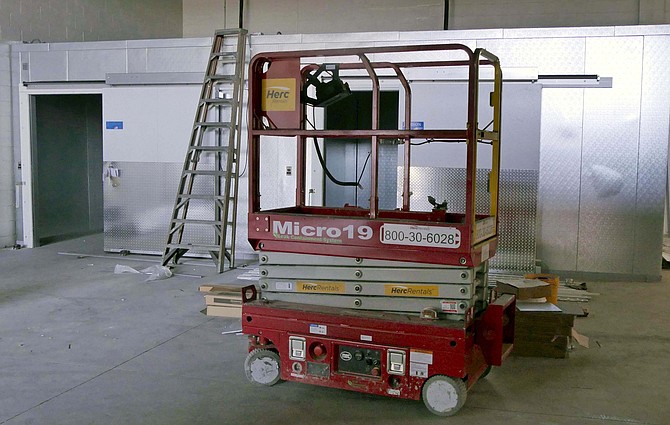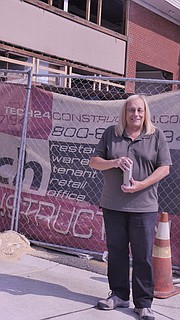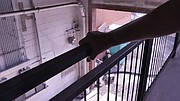The new $80,000 refrigerators in the remodeled warehouse area increase storage space by 100 percent. Photo by Shirley Ruhe.
A line forms on July 15 outside the AFAC (Arlington Food Assistance Center) building on S. Nelson Street as people wait with their bags and rolling carts for a week’s supply of supplemental groceries. Next door, construction of additional warehouse space is well underway to add 4,600 square feet for AFAC food storage.
Charles Meng, CEO and Executive Director of Arlington Food Assistance Center, says the new building will increase the storage capacity allowing AFAC to purchase more in bulk and buy at a bigger discount. And with increased storage they will be able to expand their services to serve needy families outside Arlington.
Last year AFAC purchased 1.2 million pounds of food and received 1.5 million pounds of donated food. Arlington County provides $555,000 to purchase food but the total food budget is $1.2 million to meet the demand so they still need to raise $645,000. Meng says Arlington provides 6.9 percent of the $8 million it takes to operate AFAC for a year.
Currently, AFAC provides supplemental groceries to an average of 2,300 families a week as well as delivery to five senior centers. Meng pulls out a big book of statistics. “We run on statistics. For instance, in May we had 10,064 visits. This represented 2,013 families with 4,972 individuals, half kids less than 18 years old.” He compares that to October 2001 when they served 529 families a week.
Meng says during COVID the need for supplemental groceries increased with 2,334 families requesting assistance for the first time due to economic hardship.
The additional space will allow AFAC to have 100 percent more refrigeration and freezer capacity with the $80,000 purchase of two giant refrigeration units. “A lot of eggs, milk, vegetables and produce have to be refrigerated and frozen. This way we can buy in greater volume and get a bigger discount. Meng points to the far wall where the refrigerators are located. “We put in an insulated slab under the refrigerators and added one over this way for the future.”
“We are buying healthy food that people pass over when they are shopping because it is expensive. By having macaroni and cheese in the grocery basket, what does that provide for your kids? Fat, salt and sugar. That leads to childhood obesity.”
Meng says Arlingtonians generously donate in the many AFAC boxes widely located around the area — cereal, tuna, canned tomatoes, rice — many of the most basic requested supplies. “But we get everything donated from seaweed to cans of something the kids don’t like.”
The building was purchased in October 2020 and construction started in early March 2021. COVID was not an issue because so many other construction projects were on hold at the time. “We worked with Tech 24 who did the original building and with the same excellent project manager.”
He explains, “This construction is a brand new building in the walls of an old building built in the ’50s. We took off 70 years of accumulated roofs, one on top of the other and put on a new roof.” And they will be adding skylights.
In addition, the renovation includes a new floor after the discovery that they had bad subsoil conditions that allowed the building to settle differently resulting in large cracks. “We took out five feet of dirt and put new compacted gravel under the floor.
A worker is measuring a large sheet of plastic, which will protect the new sheet rock on the walls. “It is easy to clean. We wanted something low maintenance, to do it right the first time. And there are plastic bands along the lower wall to keep forklifts from damaging the walls. There are better things to spend money on than maintenance.”
He points to the wiring and plugs along the wall. “See all new electricity, and the plumbing is new, too.
“You see that black spot on the wall? We’re going to knock out a doorway to the next building for ready access.” Meng adds, “Of course the whole building is ADA handicapped accessible.
The new addition was funded with legacy gifts from people’s wills and estates. “We used it to purchase the building and renovate the space.” Meng adds they are still raising money for it but he has confidence it will be paid for.
“We are currently in good shape and debt-free.” The new building is expected to be open in September of this year although there could be delays in terms of availability of materials.
Meng looks ahead to their ten-year future. “Food insecurity doesn’t just happen overnight and can last weeks, months, years. Our mission statement states ‘an independent, community-based non-profit food pantry that provides dignified access to nutritious supplemental groceries to all of our neighbors in need.’”
He notes the long-term trend for assistance is moving downward as low-income families are being pushed out of Arlington by lack of affordable housing. “The cost of living is getting outrageous.”
“Our purpose is to feed needy families wherever they may be.”


